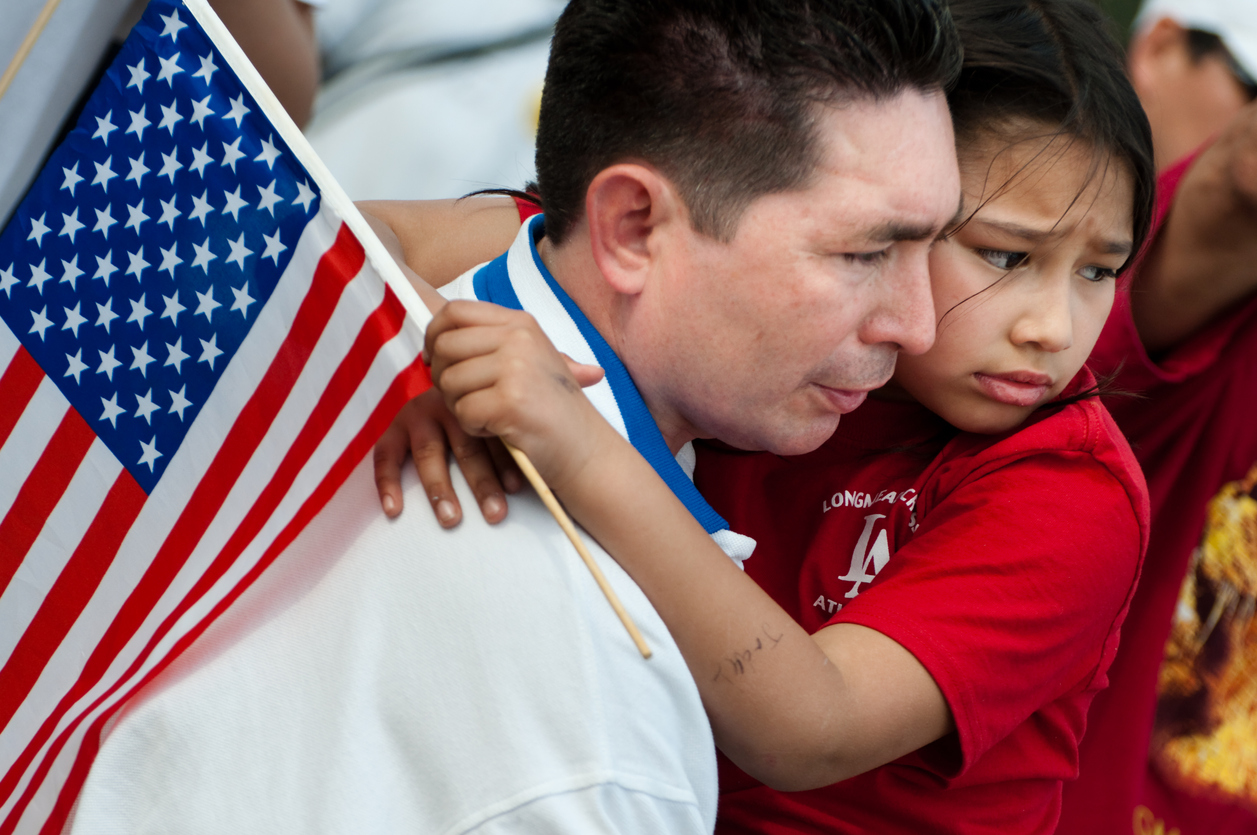
Share On Social!
Latinos widely agree that the immigration system in the United States needs a large overhaul, according to a new survey by PEW Research.
“A majority of Latino immigrants and those born in the U.S. share the view that the country’s immigration system needs fixing, and this sentiment extends across all ages and education levels,” according to researchers Jens Manuel Krogstad and Mark Hugo Lopez.
While most Latinos agree changes are needed in immigration policy, priorities differ depending on political party and legal status.
This survey of Latinos on immigration comes four months into the Biden presidency, which has promised to enact various changes that would help Latino immigrants. These include defunding the U.S. and Mexico border wall, ending family separation at the border, reversing the public charge rule, and preserving DACA.
Let’s take a look at the different immigration issues that matter to Latinos.
What Does the PEW Research Survey Say?
PEW researchers surveyed 3,375 Latino adults in March 2021 via phone and mail.
The key findings on the overall opinion on immigration reform are the following:
- 53% of Latinos believe the immigration system requires major changes
- 29% of Latinos believe the immigration system must be completely rebuilt
The survey showed that among immigration policies, Latinos want the U.S. to prioritize policies concerning DACA and COVID-19:
- 52% of Latinos believe it’s very important for the U.S. to allow Dreamers to apply for legal status
- 51% of Latinos believe it’s very important to establish a way for undocumented immigrants to stay as legal residents
- 50% of Latinos believe it’s very important to restrict immigration from countries with high COVID-19 infection rates
Depending on Latinos immigrants’ legal status, opinions on priorities varied:
- More naturalized citizens (56%) than those born in the U.S. (39%) say it is a very important immigration policy goal to increase security along the U.S.-Mexico border
- 87% of undocumented Latino immigrants believe establishing a way for undocumented immigrants to stay legally is very important compared to only 43% of U.S. born Latinos
In addition to legal status, political party also determined opinions on immigration:
- 68% of Republican Latinos say increasing security along the U.S.-Mexico border is very important, compared with only 33% of Democrat Latinos
- Most Republican Latinos (59%) say it is a very important goal to prevent people from overstaying their visas, compared with only 30% of Democrat Latinos
The survey also measured awareness of the increase in children and families arriving at the border, including the perception of the government’s handling of the influx.
- The vast majority of Latinos in the U.S. say they have heard a lot (52%) or a little (39%) about the increase in children and families seeking asylum at the U.S.-Mexico border
- Only 5% of Latinos think the federal government has done a very good job dealing with influx, with 31% thinking they’ve done a somewhat good job
To address many of these immigration concerns, President Biden has begun taking action in the first few months of his presidency with executive orders and proposed legislation.
“[Biden] took steps to allow unauthorized immigrants who arrived in the U.S. as children to stay in the country legally and stopped construction of a wall at the U.S.-Mexico border. Biden has also proposed legislation that would make it easier for prospective immigrants to come to the U.S. legally and increase spending on technology to secure the border. It remains to be seen whether Congress will take up a comprehensive immigration bill or pursue more targeted legislation that affects only certain parts of the country’s immigration system,” according to Krogstad and Lopez.
The Effects of Immigration on Latinos
Many Latinos want immigration reform. But they are divided on how to prioritize policy changes, indicative of the divisive, all-encompassing impact of immigration.
In fact, immigration can be a traumatic, stressful process for Latino families and children.
“Latino families face tough finances and difficult travel before and during migration to the United States. Many Latino children are separated from parents. After migrating, they face language issues and discrimination,” according to a Salud America! research review.
Latino immigrants also face discrimination due to moral disengagement. This is the mental process of decoupling one’s internal moral standards from one’s actions ─ allowing one’s self to conduct unethical behavior without feelings of guilt or distress.
“A perceived threat to the identity associated with the in-group, such as the belief that an influx of unskilled immigrants will result in lower wages and higher rates of unemployment for non-immigrants or the goal to preserve the national language, can result in moral disengagement-based discrimination and prejudice toward immigrants,” according to a Salud America! research review.

If Biden is able to successfully enact immigration reform, his policies may have wide-ranging impacts on Latinos.
For example, Biden has pledged to review former president Trump’s public charge rule, which was harmful for Latino immigrants in that it dissuaded them from taking part in nutrition and housing assistance programs in fear of it affecting their immigration status.
Biden has also moved to protect DACA, known as Deferred Action for Childhood Arrivals, an Obama-era policy that shields young immigrants from deportation by giving them short-term work permits.
As the majority of DACA recipients are from Mexico and Central America, the preservation of this policy will allow many more Latino immigrants to work in the U.S. without fear of deportation.
To read more about Biden’s immigration policy reforms, click here.
How Else Can We Support Latinos?
Latinos and advocates hope that hefty immigration reform is on the horizon.
While many have celebrated Biden’s executive orders and proposed bills as victories, others say persistence is key.
“It’s just the beginning. Now we have to see what else they’re going to do,” said Lorella Praeli, president of Community Change Action, an organization that fights for equity for low-income people, according to The Hill. “They’re going to have to put in serious political capital and prioritize legalizing people via congressional action and continue to take seriously the need for a massive overhaul of our immigration enforcement system.”
While legislators work on providing equity for Latinos on the federal level, you can make a difference by advocating for your neighbors at the community level.
You can push for your neighbors to have equitable access to resources like food, education, healthcare, and more by downloading a customized Salud America! Health Equity Report Card.
Email your Health Equity Report Card to community leaders, share it on social media, and use it to make the case to give resources where help is needed most.
GET YOUR HEALTH EQUITY REPORT CARD!
Explore More:
Embracing ImmigrantsBy The Numbers
44
million
immigrants live in the United States



